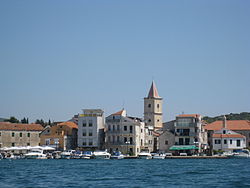Pirovac
Pirovac | |
|---|---|
| Općina Pirovac Municipality of Pirovac | |
 | |
| Coordinates: 43°49′N 15°40′E / 43.817°N 15.667°E | |
| Country | |
| County | |
| Government | |
| • Mayor | Ivan Gulam (Fokus) |
| Area | |
| • Municipality | 39.1 km2 (15.1 sq mi) |
| • Urban | 25.1 km2 (9.7 sq mi) |
| Population (2021)[2] | |
| • Municipality | 1,606 |
| • Density | 41/km2 (110/sq mi) |
| • Urban | 1,434 |
| • Urban density | 57/km2 (150/sq mi) |
| Time zone | UTC+1 (CET) |
| • Summer (DST) | UTC+2 (CEST) |
| Website | pirovac |
Pirovac (Slosella in italian) is a coastal municipality and village in Croatia, 26 km away from the city of Šibenik.
Demographics
[edit]The Pirovac municipality has a total of 1,930 inhabitants, in the following settlements:[3]
93% of the population are Croats.[4]
History
[edit]The first historical mention of Pirovac was in 1298, under the name "Zlosela". At that time, the village belonged to noblemen from Bribir — the Šubić family, and later it became the property of the Šibenik Diocese and noblemen from Šibenik.[5]
The settlement itself was founded in the 15th century by refugees who fled from the Turks. Nevertheless, this area was inhabited many centuries earlier, as shown by remnants of Roman settlements found on the islet of Sveti Stjepan (St. Stephen). Many other historical monuments tell us about the gradual settlement and development of this place. The remnants of a Roman villa in Ivinj date back to the 1st AD. The site was proclaimed a cultural good in 2012 and awarded the status of a protected cultural monument.[6]
The defence wall, erected around 1505 by Petar Draganić, has been partly preserved in the village. The 1506 parish church of St. George was restored in Baroque style in the 18th century. The graveyard chapel of the Draganić-Vrančić family features a Gothic sarcophagus with a relief made in 1447 by Andrija Budčić from Šibenik and Lorenzo Pincino from Venice, according to the sketches by Giorgio da Sebenico (George the Dalmatian). Roman artifacts have been found on the islet of Sveti Stjepan in front of the village; here also are the ruins of a Franciscan monastery (from 1511), which was abandoned in 1807.
By the mid-17th century, there were 25 houses in the village. The number of inhabitants rose from 273 in 1709 to 1970 in 1931. The first school was opened in 1885. The settlement's name was changed from Zlosela to Pirovac in 1921.[5]
The village of Kašić Banjevački in the municipality was home to a Partisan monument, which was destroyed during the Croatian War of Independence. In 2008, the village replaced the previous monument with a memorial chapel to the dead from both the Second World War and the War of Independence.[7]
References
[edit]- ^ Register of spatial units of the State Geodetic Administration of the Republic of Croatia. Wikidata Q119585703.
- ^ "Population by Age and Sex, by Settlements" (xlsx). Census of Population, Households and Dwellings in 2021. Zagreb: Croatian Bureau of Statistics. 2022.
- ^ "Population by Age and Sex, by Settlements, 2011 Census: Pirovac". Census of Population, Households and Dwellings 2011. Zagreb: Croatian Bureau of Statistics. December 2012.
- ^ "Population by Ethnicity, by Towns/Municipalities, 2011 Census: County of Šibenik-Knin". Census of Population, Households and Dwellings 2011. Zagreb: Croatian Bureau of Statistics. December 2012.
- ^ a b Polić & Spicijarić Paškvan 2011, p. 203.
- ^ Ivinj Archeological Site, http://www.aquarius-online.com/en/amenities/ivinj-archeol-site/ Archived 2014-01-27 at the Wayback Machine
- ^ "Na mjestu srušenog spomenika iz NOB-e podignuta zavjetna kapelica". Slobodna Dalmacija (in Croatian). 27 October 2008. Archived from the original on 8 March 2016.
Bibliography
[edit]- Polić, Maja; Spicijarić Paškvan, Nina (2011). "Zloseljani (Pirovčani) i "Sjećanja na Zloseljane" Ljubomira Draganića Vrančića" (PDF). Radovi Zavoda za povijesne znanosti HAZU u Zadru (in Croatian) (53): 201–222. Retrieved 28 July 2020.


